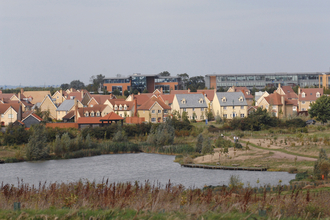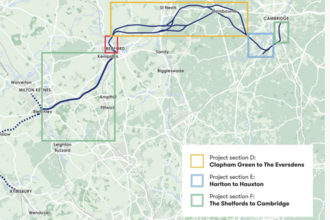As part of a group of nature conservation charities including the RSPB, Berkshire, Buckinghamshire and Oxfordshire Wildlife Trust (BBOWT) and Woodland Trust, we are responding to the announcement of Government plans for the Oxford-Cambridge Arc by calling for an ambitious target to restore nature and commitment to creating a nature-positive economy.
Government Ministers should match their ambition to double the economic output of the five counties that make up the Oxford-Cambridge Arc with an equivalent ambition to double the area of land for wildlife – from one of the lowest levels in the country.
At the same time, we continue to challenge and oppose environmentally damaging proposals made under the banner of the Oxford-Cambridge Arc, including the Oxford-Cambridge Expressway – a proposed new motorway – which was subject to a legal challenge in 2019 led by BBOWT, and has since been paused by Government.
We are calling for Government to:
- Double the area of land managed for nature – an additional 70,000ha or 6% of the area of the Oxford-Cambridge Arc
- Embed nature in economic decision making to transition to a nature-positive economy – in line with the recommendations of the Government-commissioned Dasgupta Review of the economics of biodiversity.
- Fully assess the cumulative environmental impacts of proposed new infrastructure, housing and growth to ensure it is well within environmental limits.
- Confirm the cancellation of the Oxford-Cambridge Expressway
- Commit to full electrification the new East-West Rail line
- Ensure a proposed new Arc-wide Growth Body is democratically representative, inclusive and accountable and has a remit to protect and enhance the natural environment and ‘double nature’.
On 18th February Housing Minister Chris Pincher set out the Government’s plans to establish a new sub national ‘Growth Body’ and ‘Spatial Framework’ to oversee future planning for economic growth, infrastructure and housing in the region.
The Government’s 25 Year Environment Plan sets out the ambition to create an additional half a million hectares of wildlife habitat outside of England’s existing network of designated wildlife sites.
Doubling the area of land managed for nature in the Oxford-Cambridge Arc would equate to just over 70,000ha of new land for nature – little more than 6% of its area, which is how much is currently designated as either Sites of Special Scientific Interest, Local Wildlife Sites or Ancient Woodland.
RSPB England Director, Emma Marsh said: “Doubling the area of land managed for nature in the Oxford-Cambridge Arc is a perfectly achievable and appropriate ambition for a proposal the aims to double the economy of the Arc and embody England’s 25 Year Environment Plan.
“Compared to the Prime Minister’s recent commitment to protect 30% of our land and seas for biodiversity this is a relative drop in the ocean, but for an area of the country with one of the lowest proportions of wildlife sites in England outside our big cities, it could make a huge difference to people’s quality of life and to the resilience of the natural world.
“Ministers have been very clear about the scale of their ambition for economic growth. In light of the vital importance of the natural environment in underpinning our economy and prosperity, it is high time they set similarly ambitious goals for restoring nature.”
“The impact of new development on the natural environment can be significantly reduced if it is properly planned. That requires a truly nature-led approach, respecting environmental limits. Water availability, for wildlife and people, and access to new natural spaces that buffer and link our existing, fragile sites, need to be the starting points for designing any new infrastructure in the Arc counties.”
Brian Eversham, CEO WTBCN
A nature-positive economy
We welcome commitments to protect and enhance the natural environment in the Government’s policy paper on the proposed Spatial Framework for the Oxford-Cambridge Arc – a kind of regional planning policy – but doing so will mean decisions on housing, infrastructure and the economy must be driven by the need to protect and restore the natural world on which these all depend.
Earlier this month the Government-commissioned Dasgupta Review of the economics of biodiversity published its final report, which found that our economies do not adequately reflect our dependence on nature for our livelihoods, wealth and wellbeing. We are urging Ministers and Government to heed the report’s findings and act on its recommendations by:
- Ensuring that demands on nature in the Arc do not exceed its supply, and that we increase nature’s supply relative to its current level.
- Embedding nature and the value and wealth generated by natural assets in the Arc’s economic and finance decision-making in the same way buildings, machines, roads and skills are.
Brian Eversham, CEO of the Wildlife Trust BCN, said: “The Government’s Vision for the Arc must establish it as a model for the shift to a nature-positive economy and society. The imperative to protect and repair the natural environment must be the driver for planning and decision-making to succeed in creating the nature-rich places, sustainable jobs and zero-carbon nature positive infrastructure of the future.
“The impact of new development on the natural environment can be significantly reduced if it is properly planned. That requires a truly nature-led approach, respecting environmental limits. Water availability, for wildlife and people, and access to new natural spaces that buffer and link our existing, fragile sites, need to be the starting points for designing any new infrastructure in the Arc counties.”
Estelle Bailey, CEO of Berkshire, Buckinghamshire and Oxfordshire Wildlife Trust, said: “It is clear that we are in the depths of a nature and climate emergency. Government’s ambitions and decisions must address the devastating decline of nature head on and that includes its plans for the Oxford to Cambridge Arc. The environment cannot play second fiddle to the economy and as the recently published Dasgupta review shows. If we don’t restore our natural environment, we cannot expect jobs, living standards, and our country to thrive. Any new infrastructure planned for the Arc must contribute to the solutions to tackle the nature crisis, not be another problem, and it must contribute to the Government’s ambition to protect 30% of land for nature.”
The world is watching
With the UK hosting the UN’s climate change summit, ‘COP26’, later this year there is increasing media attention and scrutiny focussed on Government announcements and decisions that conflict with their stated ambition to lead the global response to the climate and nature emergencies.
Coal mining in Cumbria, road expansion, HS2 and Sizewell C nuclear power plant are just some of the plans and projects that have attracted significant criticism and opposition on environmental grounds.
The Government can take immediate steps to prevent the Oxford-Cambridge Arc becoming part of this increasingly worrying trend by:
- Reversing the decision not to fully electrify the new East-West Rail line between Oxford and Cambridge – taken to reduce up-front capital costs, but only passing on far greater financial and environmental costs to the future.
- Confirming the cancellation of the controversial and environmentally questionable new motorway scheme between Oxford and Milton Keynes, know as the Oxford-Cambridge Expressway.


